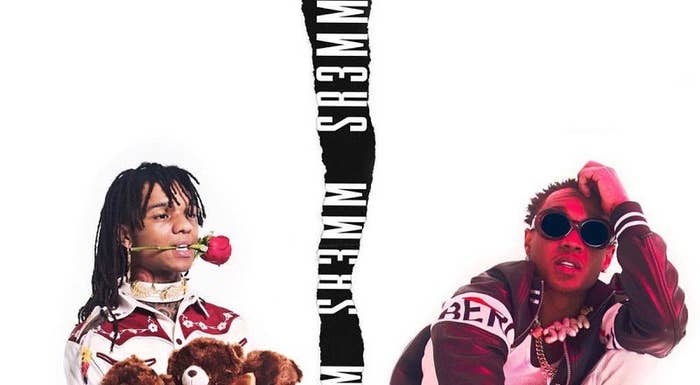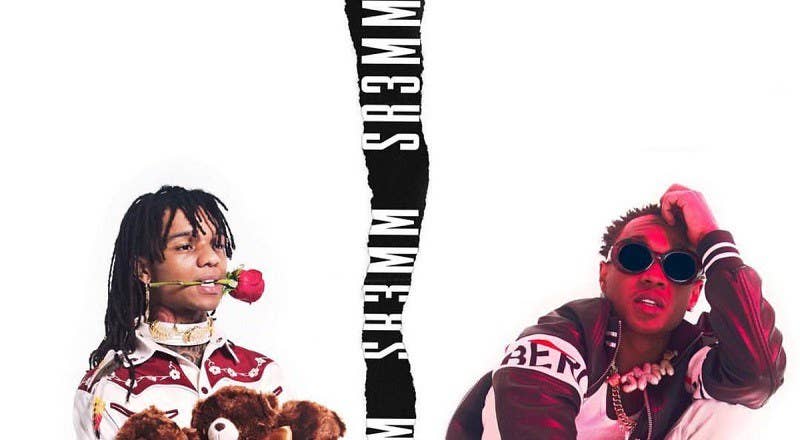
When Slim Jxmmi and Swae Lee were teenagers living in an abandoned home in Tupelo, Mississippi––this is after their mother kicked them out of the house, but before they settled on the name Rae Sremmurd––they threw raucous parties that were essentially Trojan horses designed to blast their first songs at a captive audience. It worked. Before the brothers were anything close to fully-formed artists, they were distributing tapes locally and making forays North to get on 106 & Park, and by the time they were old enough to drink, they’d been discovered by Mike WiLL Made-It, branded with his label’s name spelled backwards, showered with money, and maligned as a Kris Kross redux.
“No Flex Zone,” the duo’s breakthrough hit, was more or less universally liked as fun and endearing, and more or less universally written off as novelty. But as more singles trickled out, Rae Sremmurd started to get some critical heat: “No Type” was moody and jubilant in strange proportions, and gave the young partiers just a trace amount of world-wearied grit. When this magazine ranked their debut album, Sremmlife, No. 3 on its Top 50 Albums of 2015 list, two editors and a writer were invited on Hot 97 to justify the pick. (I was not writing for Complex at the time; two of the three representatives have since moved on to other companies, while Damien Scott is now Editor-in-Chief.)
If you’re Online, you’ve probably seen clips from this interview. Ebro Darden, who had already taken to Twitter to insist the brothers employed ghostwriters, scoffs at the idea that Swae Lee and Slim Jxmmi are capable of making an album on par with, like, Lupe Fiasco. His longtime co-host, Peter Rosenberg, peers from beneath a backward snapback and accuses the Complex staffers of giving into ironic, hipster fandom; he compares To Pimp a Butterfly to Songs in the Key of Life; he describes Future’s Monster as a “mixtape that was recorded and put out by a label,” which...yes? The word “cohesive” is thrown around a lot. At one point, Ebro turns away from the writers he’s invited on air, stares at his phone, and calls the whole thing “fucking embarrassing.”
It was not productive. The hosts drew battle lines between quote-unquote guilty pleasure rap and music that is “deep” and “lyrical” (Rosenberg’s descriptors for Butterfly, which he subsequently called “one of the greatest albums ever made in American music”). This was the sort of dogmatic, almost entirely abstract conversation about rap music that confuses aesthetic signifiers with substance, intelligence, depth, worth. Of course To Pimp a Butterfly was a more densely-written album than Sremmlife. But while Hot 97’s marquee talent was sneering at Swae and Jxmmi, the station was eagerly embracing a Rae Sremmurd ripoff of astonishing shamelessness.
At the core of Ebro and Rosenberg’s argument, and other arguments like it, is a simple, insidious idea: Rae Sremmurd makes music that’s fun––just fun. Not substantive, intelligent, deep, worthy. It’s an attitude that births stuffy, needlessly convoluted television and pop records with clumsily ornate flourishes. If you get deep into the weeds of modern arts criticism, the pendulum can sometimes swing too far in the opposite direction (where poptism––pop music can be just as good as more studied rock/jazz/classical works––becomes populism––this record is popular, therefore it is good). But on the whole, Ebro and Rosenberg’s philosophy tends to age poorly, and in its time threatens to erase excellent art that is less overtly serious.
They did, though, have a point. Sremmlife is good, to be sure, but it was not the third- (or fourth- or even tenth-) best record of 2015. It occasionally transcends (“No Type,” “This Could Be Us,” “Come Get Her”) but also suffers from some softened, late-to-the-party Lex Luger-lite (the crass and corny “My X”) and gestures at EDM (“Safe Sex Pay Checks” being the worst offender) that are, frankly, embarrassing. Swae was only beginning to develop into the wink-and-nod crooner he is today; Jxmmi was still finding his sea legs, but was reliably colorful, like when he drawls, on “Come Get Her”: “I was chillin’ with the open container,” container prying his voice as wide as it goes. It was an album by promising young artists who weren’t quite sure how to harness their considerable talent and considerable resources.
Sremmlife 2, released a year and a half later, spawned fewer genuine hits but was a marked leap forward. It dove further into that end-of-the-buzz ennui that was first broached on “No Type”; it also made better use of Swae and Jxmmi’s differences as vocalists and writers. When “Black Beatles” was in the middle of its unending Billboard reign, a rapper friend of mine pointed out that the division of labor (Swae with the finesse and Jxmmi with the force) not only gave each song balance, but actually heightened each brother’s best qualities: Swae was no longer shackled to rapping in its more limited, melody-less sense, and Jxmmi was forced to whip himself into a magnetic frenzy on every verse.
For their third album, Rae Sremmurd is splintering in a controlled setting. Now riding a crest of goodwill and critical excitement, the brothers blow up the format: SR3MM is comprised of a follow-up record by the duo, and debut solo efforts––Swaecation and Jxmtro––with the discs clocking in at nine songs apiece. The easy comparison, of course, is Speakerboxxx/The Love Below. But André 3000 and Big Boi were spiraling away from one another on that double album; SR3MM and its companion solo discs actually serve to reinforce the group dynamic. It’s like taking a watch apart to see how it works.
On streaming services, the three records are collapsed together under the SR3MM banner, although the breaks between albums are clearly demarcated. The Swae Lee solo disc is stuck in the middle, but was the most anticipated of the three projects, even back when it was only hypothetical.
Swae striking out on his own has long been tantalizing, but the absence of Jxmmi’s fuller vocals presented a problem. Smartly, the younger brother sidesteps the typical Rae Sremmurd formula, instead choosing songs that work with his voice alone—most of them evoking billowing silk shirts and a Miami Vice R&B sheen. Swaecation slinks and pauses and, when ready, propels forward; it is in no sense a rap album, and is actually illegal to play between Labor Day and May 1. Swae glides through wistful songs like “Guatemala” and “Hurt to Look” and sneers through “Heartbreak in Encino Hills”; “What’s in Your Heart?” is as if a Weeknd album cut were made by a human being. The album’s centerpiece is “Offshore,” a collaboration with Young Thug that runs five and a half minutes but could easily go twice as long. Thug––fresh off last summer’s Beautiful Thugger Girls, which at times drifted to the same tropical territory––apologizes for being a neat freak when it comes to his American currency and threatens to slap Donald Trump.
What’s fascinating about Swaecation is that it isn’t really a proof of concept for an expansive Swae Lee solo career. The SR3MM format frees him from carrying the rapping load or from nodding to the sounds that got Rae Sremmurd here in the first place, and so he’s allowed to come unmoored from them and explore a very specific, relatively narrow part of his skillset. It’s self-discovery with a safety net, and it’s more or less irresistible.
By contrast, Slim Jxmmi is faced with the opposite challenge. Jxmtro, which comes third on the consolidated streaming page, is tasked with rounding out the persona of a very capable rapper often relegated to supporting roles. His record is only intermittently successful, but its latter half is the most rewarding stretch on all of SR3MM.
It opens with early single “Brxnks Truck” and “Players Club”––pleasant but replacement-level songs––before diving into a trio of collaborations. Trouble duet “Cap” is rote; “Chanel,” which enlists Pharrell, is designed for hypnosis but is simply sleepy. (Pharrell’s falsetto aims for Future-interpolating-Three 6 but lands closer to one of those voices Adam Sandler uses when he’s trying to convince his old third-grade teacher that he’s the heir to a fracking fortune or whatever.) The most successful of the three guest appearances actually comes from a rapping Zoe Kravitz on “Anti-Social Smokers Club,” which is just goofy and off-kilter enough to play.
But that back half. “Changed Up” brings immediately to mind Devin the Dude’s “Doobie Ashtray,” a depressive gloom from 2002 that handwrings over what the rapper’s social circle looks like when the money dries up. “Juggling Biddies” is joyous and deeply Atlantan, girded by organ stabs; “Keep God First” and “Growed Up” reveal a young man making the transition from adolescent stardom to fatherhood, fumbling and fretting and makeshifting a moral code. While Jxmmi fails to land a full-length (or even nine-song) debut record, he's vastly expanding his identity and field of vision.
Paired with Swae’s narrower refinement, Jxmtro should augur for the best, or at least most well-rounded Rae Sremmurd effort to date. In some ways, that comes to pass: SR3MM makes capable, if sometimes unimaginative use of the brothers’ expanding capabilities, and while half the disc could be heard before the release date, the songs when arranged in order do suggest a musically diverse and technically focused group dialing themselves in for the long haul. But there are too many missteps for such a short running time: “42” is a name-brand version of so many stagnant SoundCloud one-offs, and both “Rock N Roll Hall of Fame” and the Weeknd-assisted “Bedtime Stories” are saccharine.
The most exciting breakthrough for the duo is lead single “Powerglide,” which reimagines Three 6’s “Side 2 Side,” and ropes in Juicy J for good measure. At their best, Rae Sremmurd had previously mutated trap into something softer, woozier, smaller, poppier; the cracks at maximalism (remember “My X”?) tended to overpower each rapper’s voice and personality. On “Powerglide,” though, they crack the formula, making something huge and propulsive and menacing––and perfectly suited to their voices. There are other successes, especially the opener “Up in My Cocina” (Swae: “When I land, in the sand, where’s my greeter?”).
It would be tempting to call SR3MM overwrought and overlong. But even if the format is another play to juice the streaming stats, it ends up being an interesting document of two brothers trying to push one another (and themselves) into new stylistic territory. Swae likely has a massive career tucked behind emergency glass, and Jxmmi, at the very least, should be able to carry more of the narrative and thematic weight on Rae Sremmurd records going forward. And even setting those projections aside: isn’t there something to be said for fun?


